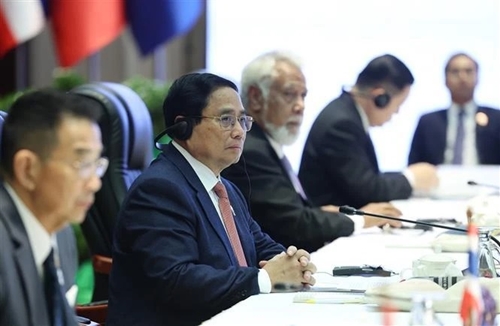At the 19th EAS, participating countries agreed to closely coordinate and effectively implement the EAS Plan of Action for 2024-2028, prioritizing key areas such as climate change response, disaster management, energy transition, resilient supply chains, maritime cooperation, health care, and education. It is also necessary to leverage new growth drivers like innovation, digital transformation and green economy, and effectively implement free trade agreements, including the Regional Comprehensive Economic Partnership (RCEP).
    |
 |
|
Prime Minister Pham Minh Chinh at the 14th ASEAN-United Nations Summit in Vientiane on October 11 |
They discussed a range of international and regional issues, underscoring peace, security, and stability in the region as essential for promoting inclusive, resilient, and sustainable development. Partners expressed their support for ASEAN’s balanced and objective approach and common stance on these matters.
In his remarks, Prime Minister Chinh highlighted the need for ASEAN and EAS partners to enhance dialogue and collaboration, build strategic trust, enhance commonalities, minimize disagreements, respect differences, look toward the future, act constructively and responsibly, and work together to address shared challenges. He also stressed the importance of their concerted effort to create an open, inclusive, transparent ASEAN-centered structure that upholds international law for the sake of the people with no one left behind. He called on partners to support ASEAN's centrality with practical actions.
Acknowledging the EAS’s potential and strengths, Chinh encouraged the summit to pioneer in promoting new growth engines, prioritize cooperation in sci-tech development, innovation, digital transformation, green transition, and circular economy, among others. Furthermore, he urged the EAS to take the lead in tackling global challenges that affect all, including aging population, resource depletion, pandemics, climate change, and natural disasters.
Discussing pressing regional issues, he underscored the importance of maintaining peace, stability, and mutually beneficial development of sides involved in the East Sea, ensuring aviation and maritime security and safety in the waters. He urged all parties to exercise restraint, minimize disagreements, promote sincere, trustworthy, effective and rules-based cooperation and dialogue, effectively implement the Declaration on the Conduct of Parties in the East Sea (DOC), and create an environment conducive to the building of a substantive, efficient, effective and legal binding Code of Conduct (COC) in the East Sea in line with the 1982 United Nations Convention on the Law of the Sea (UNCLOS).
At the 14th ASEAN-U.N. Summit, the two sides stressed the significance of their comprehensive partnership and the implementation of their 2021-2025 action plan, which has so far achieved a 90% rate. Both sides agreed to develop a new action plan for 2026-2030 and to align ASEAN’s 2025 Community Vision with the U.N.’s 2030 Agenda for Sustainable Development.
Speaking at the summit, PM Chinh called for strengthened coordination between the two sides to address global challenges, contributing positively to green and sustainable development.
He expressed his gratitude for the U.N.'s quick response to help ASEAN countries recover from Typhoon Yagi and wished for ongoing U.N. support for ASEAN, particularly Greater Mekong Sub-region (GMS) nations, to boost their capacity regarding natural disasters resilience, climate change response, and just energy transition.
Based on shared interests and values in promoting multilateralism and respecting international law, ASEAN and the U.N. must continue to cooperate effectively and positively contribute to collective efforts to ensure peace, security, and stability in the world and the Southeast Asian region.
The Government leader expressed his wish for the U.N. to contribute more to maintaining peace, stability, security, and freedom of navigation and overflight in the East Sea, support ASEAN's common stance on this area, peacefully resolve disputes, and make efforts to promptly achieve a substantive and effective COC that aligns with international law, particularly the 1982 UNCLOS, serving the turning of the East Sea into a region of peace, stability, cooperation, and sustainable development.
PM Chinh also praised the U.N. and U.N. Secretary-General Antonio Guterres for efforts to resolve conflicts worldwide, including in the Middle East. He voiced concern over criticisms aimed at hindering the Secretary-General's mediation efforts and affirmed Vietnam’s support for the U.N. call to end violence, provide humanitarian aid to affected populations, and promote peaceful negotiations in line with international law and U.N. resolutions.
Source: VNA